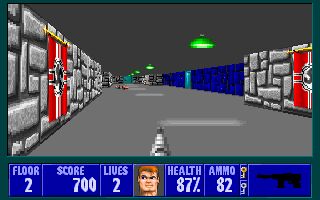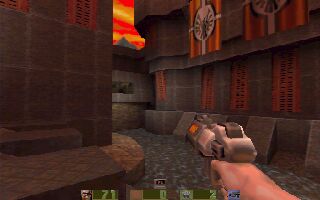Classic Games Emulation | News | Systems | Emulation | Emulators | Games | Links
Classic Games
Why play old games?
The primary reason for emulating old systems is really only because it allows us to play games that, for one reason or another, we would not ordinarily be able to play. But why do we want to play games with one eighth the resolution and one-millionth the number of colors (quite literally: 16 or less vs. 16.8 million) of modern PC and console games anyway? There are several reasons.
| Evolution |
|---|
 |
| Wolfenstein3D |
 |
| DOOM |
 |
| Quake |
 |
| Quake II |
The first is because of their historic value. When we play old games we are playing the games that led to the more modern games. Without these older games, the games we have today would never have existed. Consider the example of Quake II. It is the sequel to the 1996 game Quake, which is the successor of the 1993 game Doom. Doom was itself related to Wolfenstein 3D which was based on an old two-dimensional game, Wolfenstein, on the Apple II. The difference between Wolfenstein and Quake II is drastic, but without the former, there would never have been the latter. Many people, myself included, enjoy seeing the formative steps in the process of the evoultion of the art of video games.
The second is artistic. This is unfortunately not a word many people associate with video games, but I believe that they are an art form (see Video Games as Art). A port or conversion of a game from one platform to another may give one a sense of a game, but to preserve the artistic value of a game, one must really see a game in its original form or forms (which is not to say that a port of a game does not have value as a new creation, but it is not the same as the original).
The last is gameplay value. Few modern games have the simple, straightfoward, and effective gameplay of the old games, like Asteroids, Astrosmash, Missile Command, and so on. Many newer games excel at many other things (realism, atmosphere, and visual appeal, especially), but this is often at at the cost of gameplay value. Compare, say Adventure to Hexen II; both nominally belong to the same adventure genre, but Adventure provides a completely different playing experience. In this particular case, the real question is less of gameplay quality and more of style. Adventure is a short, quick joystick exercise, whereas Hexen II is a longer, more intense, but also a slower paced (though Hexen II is not a slow game), experience. So, even when gameplay quality is not sacrificed, most modern games by necessity have a different style of gameplay.
Which games are "classic" games?
Well, there are really two meanings to the term "classic game," and both have their purpose. The simplest is any game that has lasting value. If it still is fun to play even though it is ten years old and only has two-dimensional graphics, it is probably a classic game. Examples would be Civilization, DOOM. (Ideally, the game should have been inovative, however. Most cheap DOOM clones would not qualify, even if though they might be essentially as fun to play as DOOM itself.)
The second definition is a little more difficult to specify. Most people would probably say that any game made for a platform introduced before the NES. Some would include games made for the NES and some other systems of the same era. Some people take a different route to the same definition and call games that have a certain type of gameplay a classic game. Basically, a game that only involves one or two easily obtained skills and some simple strategy qualifies. Games that involve memorizing levels most definitely do not. Rather like Othello, these classic games "take a minute to learn, but a lifetime to master." Most early console games fit this version of the definiton perfectly. So too, however, do many newer games, while not all early games qualify. These two versions of this second definition take rather disparate routes, but both include enough of the same games to be functionally equivalent.
This site, Classic Games Emulation, focuses not only on the second
definition but the first as well. We are interested in classic games of all eras,
and also the good (even if maybe not "classic") games of the past that tend to be
forgotten. We want to remember the history of this art, where we have come from.
![]()
Classic Games
- Atari 2600
- Commodore 64
- PC Games
About CGE (including contact information)
Created March 28, 1998. Last updated July 27, 1998.